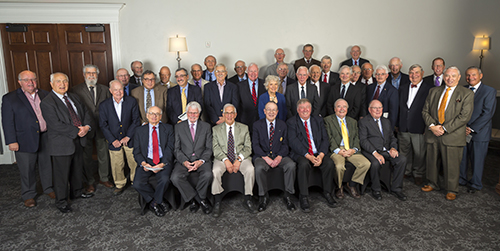
The State Bar of Wisconsin recognizes 38 lawyers from the class of 1966 for 50 years in the practice of law at a luncheon May 10 in Delafield. View the full list of 50-year members and check out the State Bar’s Facebook page for more photos from the 50-year member celebration event.
May 18, 2016 – The year was 1966. Earl Warren was in his 14th year as chief justice of the U.S. Supreme Court, which decided Miranda v. Arizona that year. Lyndon B. Johnson was U.S. President. Warren Knowles was Wisconsin’s governor.
Ten dollars had the same buying power as $73.50 today. The “Sounds of Silence” (Simon and Garfunkel), “We Can Work it Out” (The Beatles), and “Good Vibrations” (The Beach Boys) were topping the charts. Muhammad Ali was still heavyweight champ.
The Vietnam War escalated as Johnson sent more troops into combat, and anti-war sentiment was growing back home. Student and faculty protests were erupting at U.W.-Madison, and civil rights activists began pushing hard towards fair housing legislation.
A turbulent period, to be sure. But lawyers were more civil, less divided back then, according to several who entered the legal profession in 1966. Same for politicians.
“It was not nearly as partisan,” said former Wisconsin Governor Tommy Thompson, one of more than 100 State Bar of Wisconsin members who celebrate 50 years in the legal profession this year. “Democrats and Republicans actually worked together.”
“You actually became friends with each other. You would go have a beer, lunch, or dinner together, work on solutions. It was completely different than it is today.”
Thompson, who graduated from U.W. Law School in 1966, recently joined a group of 50-year State Bar members for a celebration in Delafield. In this article, learn more about these Wisconsin lawyers and their contributions to law and beyond.
Tommy Thompson: The Governor
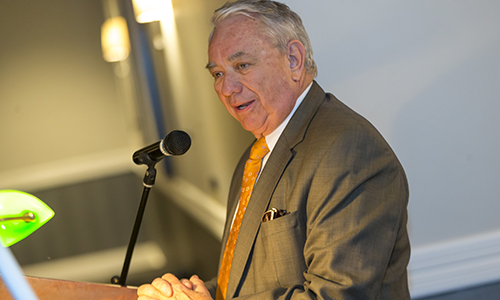
Governor Tommy Thompson congratulates the class of 1966. “It’s great to be a lawyer,” he told the group.
Thompson, a Republican, is the longest serving governor in Wisconsin history. Starting in 1987, he served 14 years (four terms) as governor until former President George W. Bush appointed him secretary of the U.S. Department of Health and Human Services.
But some may not know that before Thompson became governor, he practiced law for 20 years while serving as a representative in the Wisconsin Assembly.
“I always knew I wanted to be a lawyer in politics,” said Thompson, who grew up in Elroy. “I knew from the very beginning that it would be my life’s work.”
Working his way through college at U.W.-Madison, he served as a clerk in the Wisconsin Senate’s Judiciary Committee, under Senator Allen Busby. Then he attended law school. After graduation, he wasted no time in establishing his political career.
I knew from the very beginning that it would be my life’s work.
At age 24, he challenged a 16-year incumbent serving Adams, Juneau, and Marquette counties in the Wisconsin Assembly. And he won. “Nobody had ever gone door-to-door before. I did,” he said. “I worked harder for the votes and won in all three counties.”
At the same time, he established a general three-lawyer practice with offices in Elroy, Mauston, and Oxford. He handled everything from criminal and divorce matters to real estate and probate. Two days a week, he slipped out to the Wisconsin Assembly.
Thompson became Assembly minority leader in 1981, then decided to run for governor five years later. “As minority leader, I could never get enough Republicans elected, and I was sick and tired of getting all my ideas voted down by the Democrats,” he said.
The Thompson Governorship, which began in 1987, lasted four terms, evidence of his popularity among the people of Wisconsin. “I did things that people wanted. I reached out to the Democrats, which controlled both houses,” he said.
“I could have stopped government completely or figure out ways in which I could work with the Democrats. I thought it was much smarter to move the state forward.”
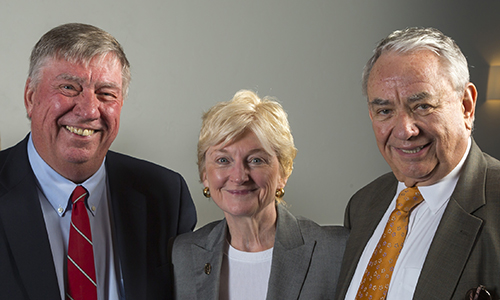
Judge Allan Torhorst, Chief Justice Patience Roggensack, and Gov. Tommy Thompson at the 50-year member recognition luncheon. Torhorst and Thompson celebrate 50 years in the practice of law.
Thompson led innovative approaches to welfare reform, economic development, school choice, and transportation, to name a few. “I was one of those individuals that believed that I could make everything just a little bit better,” Gov. Thompson said.
Thompson’s welfare programs, such as “Wisconsin Works” – which provided incentives for welfare recipients to obtain jobs and training – served as the basis for national welfare reform programs adopted under U.S. President Bill Clinton, a Democrat.
He also started Badger Care, providing health care coverage for low-income residents, and Family Care, addressing long-term care for the elderly, still going today. Thompson said his legal background assisted him in tackling some of Wisconsin’s biggest issues.
“From drafting legislation to critically thinking, law school helps you become adaptable to just about any situation, and it absolutely helped me as legislator and governor,” he said. “It’s a training program for young men and women who want to solve problems.”
In 2001, Thompson received a promotion. President George W. Bush tapped him to serve as a secretary for the U.S. Department of Health and Human Services, where he served through 2004. “I was in the crosshairs of every kind of problem in the world,” he said.
In 2005, he joined Akin Gump Strauss Hauer & Feld LLP, a Washington, D.C. law firm, and became independent chair of the Deloitte Center for Health Care Management. Now he’s back in Wisconsin, working as an entrepreneur and a farmer.
And he stands firm behind his law degree: “Law school teaches you how to be logical, think out of the box, solve problems, communicate, and write,” he said. “Whether or not you want to practice law, law school provides the skills to prepare you for life.”
Karen Case: Pioneer, Tax Lawyer
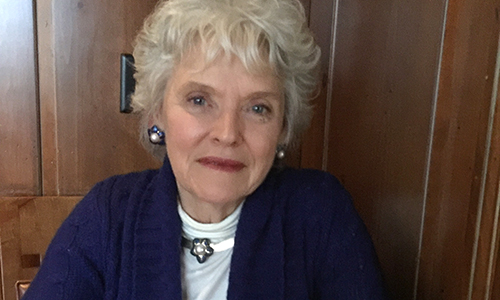
More women were entering law schools in the 1960s, but they were still largely unrepresented in the legal profession. The “women pioneers” of the 1960s helped blaze the path in law for women. The 50-year member class includes six women lawyers.
Karen Case was one of them. Case graduated from Marquette Law School, one of three women in her class of 1966. Marrianne Esposito Becker was in also her class.
Becker was Waukesha County’s first woman judge, taking the bench in 1985. She was seeking election to a fourth term, as a judge in Waukesha County’s Juvenile Division, when she unexpectedly died during the campaign in March 2003. She was 61.
“There were only three of us,” Case said. “It seemed like there was going to be an opening for women, but it wasn’t quite there yet. It was definitely challenging, in more ways than you know. We were strong friends. We experienced the same struggles.”
A math major in college, Case took accounting courses, in addition to her law courses, to prep for a career in tax law. After law school she obtained a master’s in tax law at New York University. Again, she was one of a handful of women in a class of 100.
It was like having 250 bosses.
“I had a mathematical mind and could relate to the tax law,” said Case, a Milwaukee native. “I was drawn to tax law early on and knew I wanted to pursue it as a career.”
When she returned to Milwaukee, tax lawyer Robert Meldman hired her to work on tax litigation matters, including criminal tax. Then the next big opportunity arose.
In 1987, Gov. Tommy Thompson (see above), tapped Case to be secretary of Wisconsin’s Department of Revenue. At that time, she was in her early 40s.
“It was like having 250 bosses,” said Case, who served in that role for two years. “Every state legislator could be asking for something. I was not used to the political game.”
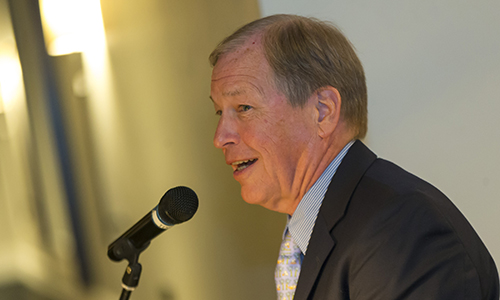
Senior Lawyers Division President Mark Petri encourages the honorees to stay active as mentors, reminding them of opportunities through the State Bar.
Case said the role took a toll. She returned to private practice in 1989, joining two other women attorneys to form the law firm of Case, Drinka & Diel. One of her partners, Diane Diel, served as State Bar of Wisconsin president (2008-09). Case worked until 1995.
She retired after a second bout with breast cancer, but has not had another recurrence since then. Looking back, she recalls a profession with more civility.
“When I was practicing law, it was a gentleman’s profession. A shake of the hand deal was the way you did business,” she said. “There was a camaraderie among lawyers. I think that’s gone today, not only in the legal profession, but in business in general.”
Neal Nettesheim: The Judge
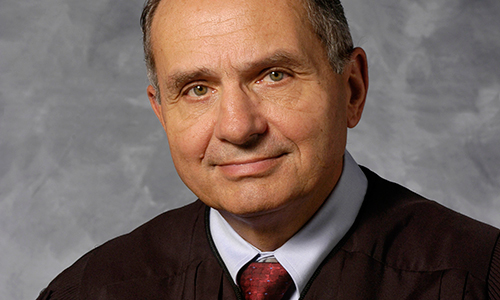
Neal Nettesheim, who spent 32 years on the bench, had his reasons for attending law school: “I went because I had nothing better to do at the time,” he said.
“I had no burning desire to be a lawyer,” he noted. “But once I graduated and started practicing law and representing people, I suddenly realized I made the right decision.”
Nettesheim, who attended Northwestern University for his undergraduate degree, went on to Marquette Law School, graduating in 1966. He began his career as a general practitioner in Waukesha, and felt most satisfied while working in the courtroom.
“I loved the courtroom. I loved trying cases. I practiced law for about 10 years, but it was really taking up a lot of my time. It was taking time away from my family,” he said.
One evening, he spoke with his wife. “She asked, ‘what do you like most about your job?’ I said, ‘the courtroom, I like trying cases.’ She said, ‘well, who has the best job in the courtroom?’ I looked at her quizzically and realized she was referring to the judge.”
It was perfect timing. The Wisconsin Legislature had just created a new judicial branch for Waukesha County. Nettesheim was only in his early 30s, young for a judge at the time, but he decided to enter the race. With a strong campaign, he won in 1975.
“I liked the drama of the courtroom, I liked working with jurors,” he said.
I loved the courtroom. I loved trying cases.
Judge Nettesheim also enjoyed working with lawyers. “Lawyers get a bad rap, but I found that most were professional, devoted, and ardent advocates for the clients and their causes,” he said. “They were devoted to the job, which is not always easy.”
And he enjoyed working with court staff. “These were wonderful people, devoted to the job and the judges. The whole system would collapse without them.”
Although Nettesheim enjoyed his time as a trial judge, one day is haunting. In 1978, a criminal defendant wrestled a gun away from Judge Nettesheim’s bailiff during court proceedings, then shot and killed the bailiff and the chief jailor before taking a hostage.
“I get upset every time I talk about it,” Judge Nettesheim said. “That was a horrible, terrible day. And it’s a day that goes through my mind every day of my life.”
But Nettesheim still recalls the lighter moments.
“An old man appeared before me, pleading guilty to bank robbery. He’s about 75 years old, and has no criminal record. I ask him why a 75-year-old man is robbing a bank. He says, ‘judge, I just wanted to know, before I died, what it would feel like to rob a bank.
“I was dumbfounded,” Nettesheim said. “I had no comeback for that. Not that bank robberies are funny. They are not. But this case took on a humorous tone.”
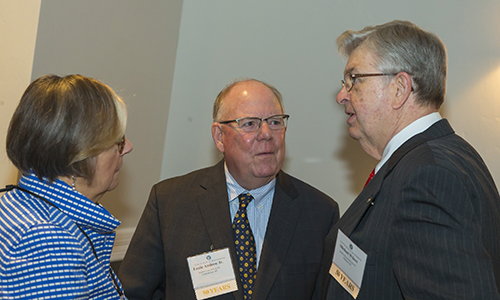
Louis Andrew Jr. and his wife and Michael Wilcox catch up during the reception.
Nettesheim served 10 years as trial judge before a vacancy opened up on the District II Court of Appeals, which covers Waukesha County. Two of the District II judges – including Richard Brown, who recently retired as chief appeals court judge – asked him to seek appointment. He almost said no, not wanting to leave the trial bench.
“But they were very persuasive, and they convinced me that I would fit in well and that I would like appellate work, so I threw my hat in the ring,” he said. “I was fortunate enough to receive the appointment from Gov. Tony Earl.” That was in 1984.
The voters continued to re-elect Judge Nettesheim to the appeals court bench, where he remained until his retirement in 2007. He ended his full-time judicial career having served as deputy chief judge (1998-2007) and at various times, presiding judge.
“Faces would change occasionally, but all of my colleagues were wonderful people,” he said. “We had our disagreements of course. Any good appellate court does. But we argued through the cases, and we maintained a healthy spirit of collegiality. I think we turned out quality appellate work product, but I will leave that for others to decide.”
Nettesheim also helped revamp the Wisconsin Judicial College, a multi-day education and training event that Wisconsin judges must attend once every six years.
In 1987, then-Wisconsin Supreme Court Chief Justice Nathan Heffernan wanted to rebuild the college. He asked Nettesheim to serve as dean and enlist associate deans to transform the college into a meaningful and beneficial learning experience.
Nettesheim protested at first. He wasn’t a teacher, he told the chief justice. But Heffernan persisted, and Judge Nettesheim acquiesced. He’s glad he did.
“That was a very satisfying experience, and one I like to think brought the Wisconsin Judicial College to the level of being now nationally recognized,” said Judge Nettesheim, who served as dean for six years and was a regular instructor.
Judge Nettesheim recently used his judicial college teaching experiences to teach judges overseas. He was selected, through a U.S. State Department program, to teach appellate structure and opinion writing to judges in Ukraine.
Although he retired from the appeals court bench, Judge Nettesheim is still very active. He serves as an arbitrator and reserve appeals court judge. He also does special master work, taking on pretrial judicial duties in multi-party, complex civil cases that require extensive judicial time. And he counsels lawyers and law firms.
When he leaves in the morning, his wife sometimes asks how his “retirement” is going. In his leisure time, Judge Nettesheim enjoys playing classical piano (he attended Northwestern on a music scholarship), travels, and visits with grandchildren.
Larry Barton: The Pilot-Lawyer
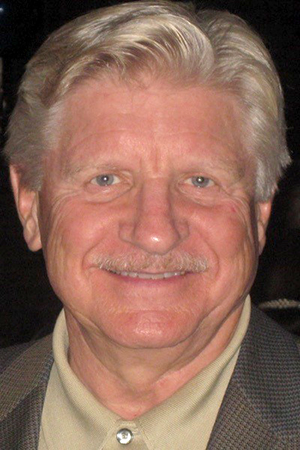
In the early 1960s, Larry Barton was an undergraduate student at the University of Illinois at Urbana-Champaign, planning to be an aviator in the Marine Corps. But halfway through college, he lost some visual acuity and could no longer pursue that avenue.
One day, after his roommate told Barton he was taking the Law School Admissions Test (LSAT) the next morning, Barton decided to take it too. “I literally walked in, wrote a check and took the exam,” he said. With a good result, he decided to attend law school.
Commissioned as a second lieutenant in the Marines, he asked for a deferment. In 1963, Barton headed to Madison to attend U.W. Law School, living in a mobile home with his young bride on the outskirts of town. He remembers the vibe around Madison.
“I was finishing up law school as students were protesting on Bascom Hill, tear gas and the National Guard and all of that,” he said. “They are protesting the Vietnam War and here I am, a Marine in law school getting ready to go in. Very interesting times.”
After graduation in 1966, he served three years as a Judge Advocate General, mostly in the Carolinas. Much to his surprise, he was never sent to Vietnam.
My wife says I flunked retirement.
When his service ended, he and his wife decided to settle down in Janesville, turning down job offers on the East Coast and Chicago. For six years, he worked at the Wickem, Consigny & Sedor law firm, where he had clerked in law school.
Then he worked six years in solo practice before merging his practice with Nowlan & Mouat LLP, a Janesville firm with roots dating back to 1857. For the next 20 years, Barton focused on litigation, mostly in the area of personal injury.
In 2001, he retired but stayed on as “of counsel” until 2008. In his “retirement,” he also does mediation work and continues to help lawyers, co-counseling in complex litigation. Two years ago, he took a part-time role as court commissioner for Rock County. He also spearheaded a mediation foreclosure program in Rock County.
“My wife says I flunked retirement,” said Barton, who served four years on the State Bar of Wisconsin’s Board of Governors (1990-1994).
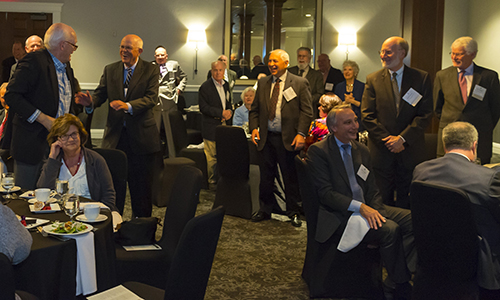
During a program honoring the class of 1966, honorees stand as their names are called by Chief Justice Roggensack.
Barton also never gave up on his aviation aspirations. He flew airplanes for 54 years, selling his last airplane just three years ago. After discharge from the Marines, he used the GI Bill to obtain the licenses and ratings to fly commercial and private planes.
He also used his wings in community service through a program called Angel Flight, which arranges free transportation for sick children and others who need life-saving medical treatment but may have financial or geographical travel constraints.
Barton also mentors a young man with cerebral palsy, and once flew him to and from a weeklong summer camp at Mouse Lake in Minnesota. “I felt a calling to help him,” said Barton, who has provided mentorship to the young man for about seven years.
“I wanted to be able devote more time to spiritual things and volunteerism,” he said. “I have enjoyed my retirement and feel very lucky that I’ve been able to keep some connection to the law and at the same time, do things for my community and people.”
Susan Porter: Big City Trust Lawyer
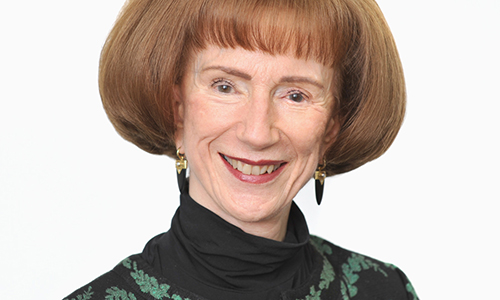
Susan Porter, who graduated from U.W. Law School in 1966, went on to serve almost 43 years at U.S. Trust in New York City. She ultimately climbed to a senior executive position as managing director. But this big city lawyer remembers where it all started.
Born and raised in Janesville, Porter attended Vassar College in New York, a political science major, then returned to her home state to attend law school in Madison.
As a House Fellow, she lived in Liz Waters Residence Hall, supervising undergraduate dorm life and providing advice and guidance to younger students. In turn, U.W. paid for her room and board, her tuition, and she received a stipend for law books.
After graduation, she landed a job with solo Madison attorney William (“Bill”) Bradford Smith, who had a traditional real estate, trusts and estates practice.
“It was a fabulous experience. He was a wonderful mentor and very influential in getting me started in my career,” said Porter, who worked for Williams for a year-and-a-half.
“He believed effective lawyers had to be polished speakers. To practice, he helped me secure a teaching position at a local college. That advice was invaluable, as I’ve gone on to do all sorts of professional speaking engagements in the last 50 years.”
Williams also helped Porter by giving her responsibility. In 1966, he was running for Congress. He ultimately lost to Robert Kastenmeier. He still provided support and mentorship, but his absences that year helped Porter develop confidence to do the job.
“My first closing, I represented the seller of an A&W Restaurant franchise. That’s huge for someone just out of law school. He supported me in closing the deal on my own.”
Then it was off to New York City with her new husband, a year behind her in law school. In the Big Apple, she landed a career job at U.S. Trust, as a trust officer. Throughout her career, she climbed the ladder, advancing in a profession dominated by men.
When she first started, Porter was the only woman among approximately 100 trust officers. She eventually became the first woman senior vice president at U.S. Trust, managing trust settlement, financial planning, closely-held business and tax departments.
In New York in those days, law firms really didn't want to interview women.
“When I started, there were very few women in the legal profession. In New York in those days, law firms really didn’t want to interview women,” said Porter, who obtained an LL.M. degree in estate planning from New York University while working full-time at U.S. Trust.
Porter says 50 years later, women and minorities are still largely unrepresented in senior positions within law firms and corporations, but her early experiences helped her break through. “I was able to establish myself early, serving all those years in various roles as a professional fiduciary. At the same time, I was lecturing and speaking.”
In 2010, she left U.S. Trust and spent two years as a senior advisor at Brown Brothers Harriman. Now she’s a national fiduciary consultant, expert witness, and lecturer.
“During the years I was working in the trust industry, the trust officer played a very significant role on the estate planning team,” she said. “I was fortunate to work with some of the best lawyers in New York City at some of the best law firms,” she said. “That was an extraordinary opportunity to learn.”
She said mentors would encourage her to join groups and associations and pursue professional activities that would help build her base of knowledge and experience.
She took that advice to heart. Porter has a long list of affiliations and professional activities, including service on community and nonprofit boards and committees.
Porter is the American Bar Association (ABA) Real Property, Trust and Estate Law Section’s delegate to the ABA House of Delegates. She is also chair of the Corporate Fiduciaries Committee of the National Conference of Lawyers.
For 33 years, she has served as visiting adjunct professor at the University of Miami Law School’s LL.M. program in estate planning. For 40 years, she was a lecturer on discretionary trusts for the American Bankers Association’s Graduate Trust School.
“Having mentors at introductory and intermediate levels was very important in my career,” said Porter. “I try to provide those same mentorship opportunities to young professionals who I meet through the various organizations I’m involved in.”
Ardell Skow: The Rural Lawyer
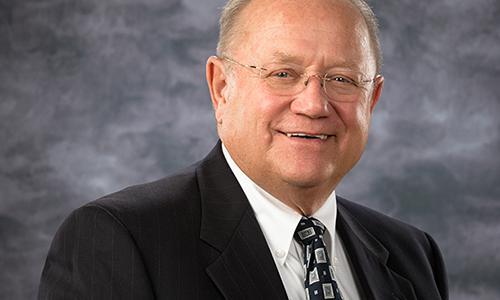
Ardell Skow still gets in his car each morning and drives the 33 miles south from his home in rural Luck to his New Richmond law firm, Doar Drill & Skow. After 50 years in the legal profession, this personal injury litigator still has the energy of a young buck.
Of course, things are different now. “There’s so much paperwork. And the motion practice, it’s incredible,” said Skow, who has tried in the area of 150 cases in his career. “And you don’t see nearly as many cases going to trial. Not like they used to.”
Skow was born and raised in Luck. His father was a blacksmith with a sixth-grade education. He never thought about being a lawyer until college at U.W.-Madison’s School of Commerce, where a business law professor encouraged him to pursue law school.
After graduation, he ventured out to Washington State, saving money for law school while working for Boeing, which was headquartered in Seattle. Then he was back in Madison at U.W. Law School, graduating in 1966. He took his first job in Madison.
He worked for American Family Insurance. Then a firm in Hudson lured him North to do insurance defense. After four years, a plaintiff’s firm offered him a partnership. He jumped at the chance to represent individuals, rather than insurance companies.
“It was a lot more rewarding to represent people, who were standing next to you when the verdict came down,” Skow said. “You hate to lose any case, but you get very close to people in these cases. It’s very rewarding when you do a good job for them.”
Then in 1977, Skow merged his practice with what was then Doar, Drill, Norman & Bakke. He has remained with that firm, now Doar Drill & Skow, ever since.
During that time, he served as president of the St. Croix Valley Bar Association and on the State Bar of Wisconsin’s Board of Governors (1978-1980).
Over the years, he has witnessed the legal profession change. “The collegiality is much different. You used to be able to do things by phone, put it on the record later,” he said.
The judge is asking me to sit down, and I won’t sit down. I’m really the one out of line.
“You took people at their word. It was common for opposing lawyers, the judge, and the court reporter to have dinner while waiting for a jury verdict. It doesn’t happen anymore.”
When lawyers started discussing mediation in St. Croix County, Skow was against it. “I thought it would just increase the cost and would not help cases get settled,” he said. “I was dead wrong about that. Mediation has settled a heck of a lot of cases to the advantage of both sides, particularly when disbursements are so significant.”
Despite the changing landscape, Skow loves the work. Asked about significant cases of his career, he doesn’t point to just one: “Every single case has significance in different ways,” he said. But he does recall the time his father became involved in his work.
A boy had lost his legs when he slipped near an IH 56 blower, a piece of farm machinery that blows silage. Skow’s father, the blacksmith, had designed and built three safety mechanisms to prevent such accidents. The manufacturer adopted two of them.
This blower did not have them. Skow had uncovered film footage of IH 56 blowers with the safety improvements. But the judge would not let the jury see the film.
“The judge wanted foundation,” Skow said. “He wanted the designer to testify as to what was in the film that I wanted the jury to see. So I called my dad, the designer. He had never been on the inside of a courtroom before."
When Skow’s father walked in, Skow was arguing with the judge.
“The judge is asking me to sit down, and I won’t sit down. I’m really the one out of line. We recess, and my dad turns to me and says, ‘boy, I can sure see you’re up against it here.’ Then we go into the hallway and he says, ‘how did he ever get to be judge.’ Just sticking up for his boy. It was heartwarming because of the recognition it gave my dad.”
When Skow looks back, he feels proud to have helped people who really needed it. But he says being a litigator in this day and age has its challenges. “It takes a lot of time. If you have a family, with two parents working, the family can suffer. But if you understand those challenges, it can be a very rewarding experience to help people find justice.”
